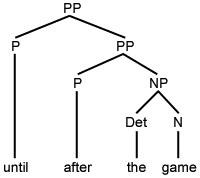Prepositional phrases
A prepositional phrase (PP) has a preposition as its head and this is usually followed by a noun phrase (for example, on the table). Some prepositions consist of more than one word and are called multi-word (or complex) prepositions. For example, adjacent to, in front of.
Contents1. Prepositional phrase dependents 2. Functions of the prepositional phrase 5. Prepositional phrases as complements Related pages |
Prepositional phrase dependents
With a few exceptions (for example, downstairs, aboard) PPs cannot contain a preposition only – they require a complement. Almost all complements follow the head preposition, but ago is an exception as it follows its complement, for example, five hours ago.
The most common dependent in a PP is a noun phrase complement, for example, in the drawer.
PPs can also contain an adjective phrase, for example, for dead. Adjective phrases can also occur as complements to the preposition as when it introduces a predicative complement, for example, Mel sees this as contemptible.
Adverb phrases, for example, until recently, as complements in PPs are rarer. Most adverb phrase complements make up fixed expressions, such as before long.
It is also possible to have another PP as a complement to the head preposition, for example, from across the road. PP complements can be one of two types: those expressing time, for example, until after the game, or place, for example, from behind the fence. There are also prepositions that require specific types of PP complements. For example the preposition instead: instead of ice-cream. This nesting of prepositional phrases can be represented diagrammatically as follows:

It is also possible for a clause to function as the complement to a preposition, for example, after the dog ran away.
Functions of the prepositional phrase
A PP relates the dependent NP to other constituents in a sentence in terms of place (for example, against the wall), time (for example, since Sunday), manner (for example, with sensitivity), agency (by Vera), goal (to them), or direction (to class).
PPs can occur as dependents of nouns (for example, the squirrel in the tree), verbs (for example, roll down the hill) and as complements to the verb be (for example, was in class).
Many nouns, verbs and adjectives require a particular prepositional phrase complement, for example; Sarah's request (noun) for neutrality was overturned, Mandy passed (verb) the butter to Will, Alan is fond (adjective) of Zoe.
A small number of prepositions have grammaticalised uses – meaning that they are used to mark grammatical functions rather than spatial relations, such as by in the passive construction, for example, Wes was bored by the performance (passive of The performance bored Wes), and of in the prepositional equivalent to the genitive, for example, the lid of the saucepan (genitive form: the saucepan's lid).
Stranded prepositions
For some constructions (all non-basic clauses) it is possible, or even preferable, to "strand" the preposition. Stranding involves separating the preposition from its complement, which is moved to the front of the clause, for example, Who did you give the flowers to? compared with non-stranded To whom did you give the flowers? There are a few situations where stranding is not really possible, for example:
*What way are you disgusted in? (stranded)
In what way are you disgusted? (non-stranded)
And conversely, there are situations in which it is required:
I want to know which one you decided on. (stranded)
*I want to know on which one you decided. (non-stranded)
Prepositions as particles
Some prepositions function as particles, which means they function as part of the verb rather than as the head of a PP, for example, set up (camp), throw out (the rubbish). These pairings of verbs with prepositions are called phrasal verbs. When the verb has an object, this can occur before the particle, for example, set camp up, throw the rubbish out. This is in contrast with a normal PP complement which would follow the preposition, for example, depend on the team, but not *depend the team on. If the object is an unstressed pronoun, it must precede the particle, for example, set it up but not *set up it.
Verbal idioms
Verbal idioms include combinations of verb + preposition that have taken on specialised meanings that cannot be recovered from the individual meanings of the verb and preposition added together (for example, look around, look after, look over).
Prepositional idioms and fossilisation
Prepositional idioms are idioms that start with a preposition (for example, on account of). These are fixed expressions and cannot be reduced (for example, *account of).
It is important to note that the idiomaticity of these expressions is a fact about the lexicon – not the grammar. From a syntactic point of view these combinations of verb + preposition are quite ordinary. This includes the fact that they may be fossilised or have optional complements like other verb + preposition pairings as well as more 'normal' types of behaviour.
Complements of prepositional verbs
A prepositional verb is a verb that takes a complement introduced by a specific preposition. For example:
Amy arrived at a decision.
Doug donated books to the cause.
Sarah masqueraded as a pirate.
Jude regarded her with contempt.
Prepositional phrases as complements
With verbs of motion, prepositional phrases expressing a goal and/or source are licensed by the verb and should be viewed as complements. Consider the following examples:
Mel flew from Melbourne to Brisbane in three hours. [source and goal]
Jude was calling from the station. [source]
Sarah put the bread into the freezer. [goal]
Some verbs can take location PPs as complements.
Sandy's rabbit is at the vet's.
Mel stayed at home all day.

